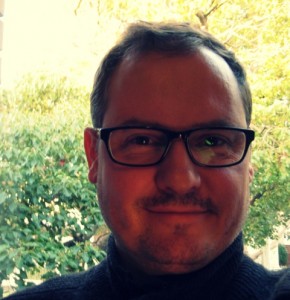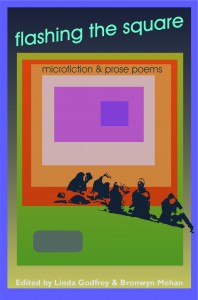1. What insp ired you to write the prose poem/microfiction which will appear in Flashing the Square?
ired you to write the prose poem/microfiction which will appear in Flashing the Square?
‘HB’ was inspired by the realisation that a simple act of friendship, a quiet moment of companionship, can also unwittingly be the most brutal experience of someone’s life.
2. Tell us about your process. (Do you start sparse and widen out, or do you write down every possible association and cut back? Do you research the subject matter you are writing about? Is it pure intuition?) Take us through an example if you want.
Literary process should mean we’re open to possibilities. When we arrive at a blank page we are ready to produce anything the idea might require to find its best possible expression. More often we can force an idea into a pre-engineered form and come away with something that feels manufactured. When I started writing HB I was prepared for a novel or a short story or a poem, conceivably a memoir or screenplay. I found after 200 words it was as complete, as clear and as sharp, as I could hope to do with thousands of words. Everything else I tried to add to the story blunted the point.
3. What advice do you have for other writers? (About the first or last line? About how to choose the title? Do you follow any rules?)
The literary act only appears to be an isolated one. In fact, it is as involved as communication between musicians in a band, though in the case of a writer the orchestra can fluctuate with thousands of others. We produce a racket when we can only hear one or two others near us and it’s even worse when a writer hears no-one but themselves. This is another way of saying a writer needs to read, but that’s the thing about advice, it needs ‘a mobile army of metaphors’ to have any chance of getting through.
Rules are good if they let your work out into the light. Rules are useless if they smother the words they’re designed to release.
Titles are vital to me. Some writers use titles as though they were handles, a means of picking a story up and putting it down. Often a title for me is the very core of the story. At times it’s the actual seed the story sprang from. In my story, HB is a reference to the letters we noticed on pencils, especially when were children, but for me, it’s what the letters stand for (Hard Black) that is more integral to the story.
The first line and last line of a story can equate to an implosion and an explosion. How words combine to create such volatile reactions within our minds and the minds of our readers is a lifelong inquiry. Like bomb makers we often end up missing a few fingers by the end of our time… if we’re lucky.
4. Who or what inspires your writing?
Reading great writing made me want to be a writer and reading great writing keeps me inspired. And there’s a lot of brilliant writing but we need to search for it in the wilderness because it’s rarely just something found by the roadside. The better a writer I become, the better a reader I am, and that is one of the real gifts in a life of writing.
5. Tell us what you do if you haven’t written anything in a while and you want to get started writing again? Could you share your favourite writing exercise with our readers?
Write every day. The hardest thing is to begin from a complete standstill. Never let yourself lose all momentum, but since that’s impossible, when you have come to a stop and it’s been some time since you wrote, write a sentence. The next day write another sentence. Don’t try to write a novel until you’ve found your daily momentum and are writing pages as though they were sentences. More important is to remember that there’s nothing better in the world than crafting a perfectly formed sentence.
A.S. Patric is the author of The Rattler & other stories, Las Vegas for Vegans and Bruno Kramzer. He has twice featured in Best Australian Stories and is the winner of the Ned Kelly Award and Booranga Prize.
To hear more Flashing the Square audio, click here.
